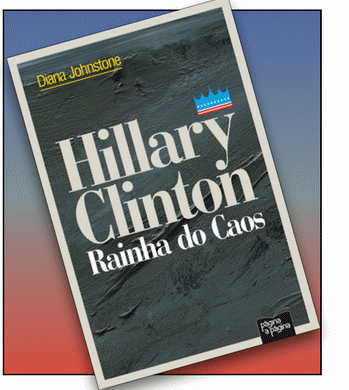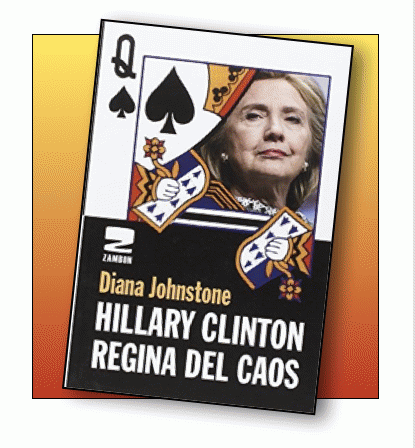| Back OpEd News | |||||||
|
Original Content at https://www.opednews.com/articles/Hillary-s-Time-Bomb-Wars-by-Joan-Brunwasser-Attack-On-Libya_Bombing_Gullibility_Hillary-2016-160413-565.html (Note: You can view every article as one long page if you sign up as an Advocate Member, or higher). |
|||||||
April 14, 2016
Hillary's Time-Bomb: Wars, Lies, and Secrets
By Joan Brunwasser
Hillary has skillfully marketed herself, with help from her friends. I have noted elsewhere that she is not a presidential candidate because of her experience. Rather her experience was designed to make her a presidential candidate. A CV with Senator from New York and Secretary of State looks unbeatable. But the record is actually disastrous.
::::::::
Interview with Diana Johnstone, author of Queen of Chaos
My guest today is Diana Johnstone, journalist and author.
JB: Welcome to OpEdNews, Diana. I recently had a great interview with Coleen Rowley about why she is adamantly against the candidacy of Hillary Clinton. She advised me to speak with you, that you had some spectacular insight on this topic. And, indeed, your most recent book is Queen of Chaos [Counterpunch, 2015]. Ralph Nader said of it, "Veteran journalist Diana Johnstone captures the imperial worldview of Hillary Clinton in memorable detail. Hillary the Hawk, as U.S. Senator and Secretary of State, never saw a weapons systems she did not support nor a U.S. war practice she did not endorse."
Diana, where would you like to begin?
DJ: Let's start with the current primary elections, which are unexpectedly interesting thanks to Bernie Sanders' surprising success in his challenge to the establishment's chosen candidate, Hillary Clinton. In my book, I stress that the power of money in the form of gigantic campaign contributions (especially since Citizens United) is a major factor in replacing democracy by oligarchy. The current Democratic primaries are tending to put that assertion to the test. Should Bernie Sanders win the nomination over Hillary Clinton, clearly the darling of Wall Street, that would show that popular enthusiasm can still defeat the power of Wall Street. I would enjoy being proved wrong.
JB: Yes, we would all love to believe that an outsider with principles can trump money.
DJ: In any case, my book will remain timely, because it is mainly a critique of all that is wrong about current US foreign policy. The issue is largely neglected even though it is the most crucial, because the way things are going, Washington risks leading the world into nuclear war.
JB: Nuclear war?! Talk about starting the interview off with a bang! Before we head in that direction, Diana, let's deal specifically with the case you make against Hillary Clinton whom you dubbed Queen of Chaos. That's particularly relevant to our readers in this primary season. In spite of Bernie Sanders' miraculous and consistent wins, eight out of the last nine primaries and caucuses, Hillary continues to be perceived as the inevitable nominee. So, please state your case.
DJ: I start off with a bang because the situation today is dangerous. I wrote this book essentially as a warning.
Two things in particular inspired me to write this book. One was the totally unjustified war that destroyed Libya, a country I happen to have visited and know something about. Most people are totally unaware how much falsification was used to justify that war. Hillary pushed Obama into that war and is quite ready to use it as model for further "regime change" in countries whose leaders she doesn't like.
The other thing that inspired me was the totally disproportionate hostility aroused against Vladimir Putin and Russia as a result of the Ukrainian crisis, which was incited largely by Washington and the European Union. That hostility was already brewing, and Hillary has kept it stirring. These events are part of a trend toward a much greater war than people today think possible.
At this moment, NATO is engaged in a huge military buildup that is clearly aimed at Russia, with manoeuvres and exercises right up to the Russian border, at the same time that politicians and media are engaged in Russia-bashing that sounds like nothing other than pre-war propaganda. Yet only a few people seem properly alarmed. I can name a few: John Pilger, Stephen Cohen, Ralph Nader. But the media and the politicians ignore this danger, and make a huge fuss about dangers that are very minor compared to a war between NATO and Russia.
I don't imagine that Hillary Clinton would deliberately start World War III. Rather, the situation is dangerously similar to the eve of the First World War, with major powers massively armed and suspicious of each other, when a minor incident set off catastrophe.
I call her Queen of Chaos because today, the result of war is chaos, not conquest. Look at the results in Afghanistan, Iraq, Libya, Syria. There are no real winners, only losers.
JB: So, your major beef with Hillary is on the foreign policy front. We'll get back to that in a bit. Does your critique extend to other policy issues closer to home as well? If so, what might they be?
DJ: I see foreign policy and domestic policy as interlocking. Basically, the US economy is radically distorted by the military-industrial complex, which influences both foreign and domestic policy. Financial capital, whose wish list is now determining policy all over the Western world and beyond, loves the military-industrial complex because Pentagon contracts ensure a comfortable profit on investment. And the military-industrial complex loves "threats" because they provide endless pretexts for developing more and more extravagant weapons systems. Hillary Clinton is notoriously the favorite of Wall Street because she supports these interests, including the wars and threats that justify them.
Hillary claims that no one can prove that she changes policies to please her Wall Street donors. In fact, her whole approach is identical to theirs: provide more space for financial investment by privatizing public services, education, prisons, health care, and so on. That is why Americans spend much more on health care than, say, the French, who live longer, because in the US system shareholders and corporate executives have to take their slice.
The Clintons have abandoned the working class, single mothers, the part of the population in greatest difficulty, in favor of what is called neo-liberalism, which simply means working for finance capital. They still pretend to be progressive by "identity politics", proclaiming that women and members of minorities should be able to "shatter the glass ceiling". This means forgetting about the majority in favor of a successful minority of minorities or of women.
Bernie Sanders advocates quite the opposite. His policies, such as single payer health insurance, would benefit the majority at the expense of financial speculators. Bernie's shortcoming, however, is that so far he fails to spell out the link between domestic and foreign policy. To finance his program it would be necessary to make drastic reductions in the military budget, which implies a less aggressive foreign policy. He rightly criticizes Hillary's ties with Wall Street without denouncing her ties to the war machine.
JB: How does a candidate who doesn't favor endless war or a budget tilted toward military needs and tightened belts everywhere else make headway against all the formidable powers arrayed to keep the status quo?
DJ: Incidentally, our current status quo is never really a status quo, because things are not staying the same but getting worse. By poor general education and mass media distractions, people are kept ignorant of how much worse things can become if the war policy continues, as Hillary clearly intends. There needs to be a movement to end this war policy that involves not only hundreds of thousands of citizen protesters but also individuals in key positions in society, notably military men and women, who say no to this suicidal trend. We need a sort of mass strike for peace. But alas we are very far from that level of consciousness and action. On the one hand, I don't believe this electoral campaign can possibly defeat those dominant powers, but on the other hand I can't help hoping because time is running out.
JB: I'm with you there. Let's go back to something you said earlier. You mentioned that one of the reasons you wrote Queen of Chaos was seeing what happened in Libya, a place you had more than a passing acquaintance with. No one loved Gaddafi. But you're saying that it was largely Hillary who pushed for the "regime change." Please tell us more about that. Many would not see that as a bad thing, by the way.
DJ: You say, "No one loved Gaddafi." That cannot be exactly true, because in Libya, on July 22, 2011, in the middle of the NATO bombing campaign, a million Libyans demonstrated for Gaddafi and against NATO in Tripoli. The pictures are there to prove it, but it was not front page news in the West. No "dictator", busy with a foreign assault, could force a sixth of the entire population to go into the streets carrying banners and shouting slogans on his behalf. The demonstrators no doubt had not forgotten that Gaddafi had transformed a poor, sparsely populated desert into the country with the highest standard of living in Africa.
JB: I didn't know any of that, Diana. I actually was referring to most Americans.
DJ: So in Libya itself, some people loved Gaddafi and other people hated him. Who were those other people? Mostly Islamists in Eastern Libya, notably in Benghazi, who had always been opposed to Gaddafi mainly because of his efforts to modernize Islam and Libyan society.
Moreover, millions of Africans loved Gaddafi. He had sponsored African unity and development. He was preparing to use Libya's huge wealth to sponsor a single African currency that would free Francophone Africa from dependence on a French-backed currency, the CFA franc. Reason enough for French President Sarkozy not to love Gaddafi. Also reason for some of the Libyan elite to turn against him, because they would rather keep the profits for themselves, as in Qatar.
Okay, let's say that in Washington, Paris and London, no one loved Gaddafi. What is astonishing here is that so many people in the West consider that because we don't love a particular leader, it is perfectly fine to use our missiles, bombers and special forces to ravage the country and overthrow its government. There are many leaders of countries we don't like. There are even more we've scarcely heard of but could quickly learn to hate once the mainstream media go after them. In short, Americans in particular have interiorized the neocon ideology. National boundaries, international law, mean nothing. The United States has the privilege to decide which national leader can stay and which must go. By whatever means necessary. This is a drastically alarming mindset, whatever the faults of Gaddafi. It is truly alarming that the population of the most aggressive power in history can so easily be persuaded to hate a leader or country about which they are profoundly ignorant.
I will just say this. Like many human beings, Gaddafi had virtues and faults. All those who echo that he was a "bloodthirsty dictator" would have a hard time providing the evidence to prove that statement. He was blamed for the 1988 terrorist attack that brought down PanAm flight 10 over Lockerbie, Scotland, killing 270 people. Numerous independent researchers have concluded that he was framed by the United States (see my book). He was not responsible for the "Bulgarian nurses" case which caused a scandal a few years ago. Both the French and the US governments had tried to assassinate Gaddafi in the past, mainly because of his support to various revolutionary movements.
Hillary's emails disclose that she and her advisors hoped that her regime change success in Libya would be a main argument in favor of her election as President. They suggested using Libya as the basis of a "Clinton Doctrine." It is no secret that she bore major responsibility and indeed wanted to claim that responsibility. As Secretary of State, she not only pushed Obama into the war, she sabotaged efforts to find a peaceful solution and finally gloated over the brutal murder of a foreign head of state. This indicates that she aspires not only to be President, but also to be a War President.
I recommend "Queen of Chaos" especially for the chapter on Libya, which is the moral heart of the book.
JB: Yes, I want to read it. I'm learning things right and left. So much to talk about. One aspect of the email "flap" is that Libya was part of Hillary's larger political agenda to achieving the presidency? That's a scary thought. Is this revelation getting the attention it deserves?
DJ: Certainly not all the attention it deserves, although it has been reported, for instance by Robert Scheer:
"That Clinton had strenuously supported the bombing that destabilized Libya beyond recognition as a nation was confirmed in an email to her from her confidant Sidney Blumenthal, who on Aug. 22, 2011, proclaimed the start of the bombing as 'a historic moment' and added 'you will be credited for realizing it.' Blumenthal went on to predict that '[w]hen Gaddafi himself is finally removed, you should of course make a public statement before the cameras wherever you are, even in the driveway of your vacation home. " You must go on camera. You must establish yourself in the historical record at this moment. " The most important phrase is: 'successful strategy.' "
Clinton approvingly forwarded this message to her top State Department assistant, Jake Sullivan, noting that it's premised on being said "after [Gaddafi] goes, which will make it more dramatic." Sullivan replied that "... it might make sense for you to do an op-ed to run right after he falls, making this point. "You can reinforce the op-ed in all your appearances, but it makes sense to lay down something definitive, almost like the Clinton Doctrine."
This was revealed too late to be in my book. But it clearly indicates that State Department officials were planning to exploit the bloody destruction of a country and its leader for political purposes.
JB: Do you think that knowing this can affect the primary race? Or are our fellow citizens so cynical that it won't affect how they look at Hillary? In fact, one could make an argument that this is an example of how effective she is, how she gets things done.
DJ: I tend to believe that most people are not cynical, insofar as they think they are doing the right thing. The problem is that what most citizens believe about the world comes from biased sources, so that what they think is the right thing is really the wrong thing. Americans are notoriously ignorant of history and geography, much less the history and politics of the Middle East, Africa, Asia. When you don't know why your neighbors are yelling at each other, you don't grab your rifle, go break down their door and start shooting. Americans are sure to know even less about why they are shooting in Syria, Ukraine or Yemen, so the simple wise advice is to keep out. Hillary wants to rush right in.
Hillary has skillfully marketed herself, with help from her friends. I have noted elsewhere that she is not a presidential candidate because of her experience. Rather her experience was designed to make her a presidential candidate. A CV with Senator from New York and Secretary of State looks unbeatable. But the record is actually disastrous. The problem with ordinary people is not so much cynicism as political consumerism. Hillary is a well-packaged product, with a massive advertising campaign promoting her as "our first woman president." The problem is not so much cynicism as gullibility. But we must hope that people's basic common sense will warn them that they are being deceived, and dangerously deceived. There are signs in the country of a return to common sense, and we must keep encouraging them.
JB: Indeed, Diana. I definitely feel more well-educated on the disturbingly dark side of Hillary Clinton. And I'm happy to share what you've taught me with our readers. Thanks so much for talking with me.
***
my interview with Coleen Rowley:HRC is a Neocon
Watch Hillary laughing about Gaddafi's murder in this YouTube news interview video: "We came, we saw, he died."
Shout out to Meryl Ann Butler for the savvy editorial tips and great images!
Thank you, Coleen Rowley, for suggesting this interview.
Authors Website: http://www.opednews.com/author/author79.html
Authors Bio:
Joan Brunwasser is a co-founder of Citizens for Election Reform (CER) which since 2005 existed for the sole purpose of raising the public awareness of the critical need for election reform. Our goal: to restore fair, accurate, transparent, secure elections where votes are cast in private and counted in public. Because the problems with electronic (computerized) voting systems include a lack of transparency and the ability to accurately check and authenticate the vote cast, these systems can alter election results and therefore are simply antithetical to democratic principles and functioning.
Since the pivotal 2004 Presidential election, Joan has come to see the connection between a broken election system, a dysfunctional, corporate media and a total lack of campaign finance reform. This has led her to enlarge the parameters of her writing to include interviews with whistle-blowers and articulate others who give a view quite different from that presented by the mainstream media. She also turns the spotlight on activists and ordinary folks who are striving to make a difference, to clean up and improve their corner of the world. By focusing on these intrepid individuals, she gives hope and inspiration to those who might otherwise be turned off and alienated. She also interviews people in the arts in all their variations - authors, journalists, filmmakers, actors, playwrights, and artists. Why? The bottom line: without art and inspiration, we lose one of the best parts of ourselves. And we're all in this together. If Joan can keep even one of her fellow citizens going another day, she considers her job well done.
When Joan hit one million page views, OEN Managing Editor, Meryl Ann Butler interviewed her, turning interviewer briefly into interviewee. Read the interview here.
While the news is often quite depressing, Joan nevertheless strives to maintain her mantra: "Grab life now in an exuberant embrace!"
Joan has been Election Integrity Editor for OpEdNews since December, 2005. Her articles also appear at Huffington Post, RepublicMedia.TV and Scoop.co.nz.




